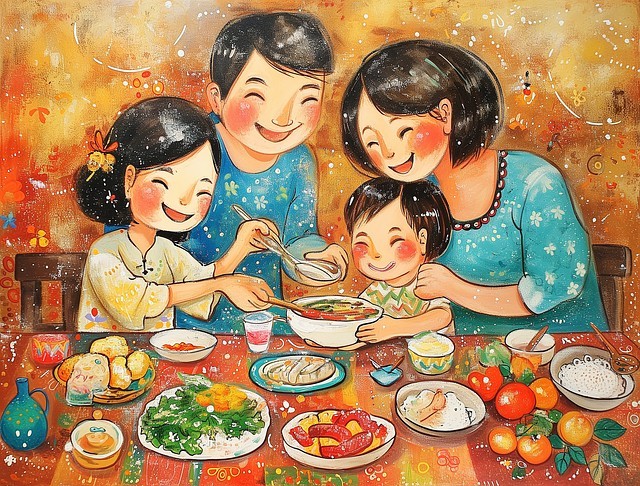The Crumbling of Human Connection: How Materialism is Eroding Our Spiritual and Cultural Foundations
views
Introduction: A Mother’s Wisdom in a World Upside Down
"We use things and love people, but this era has succumbed to using people and loving things." - Inday Ponsa
My mother’s words, spoken over a simple dinner of sinigang and rice, linger in my mind as I scroll through an endless feed of curated lives—each post a performance, each like a transaction. We live in an age of unprecedented wealth, yet our souls feel emptier than ever. The bonds that once tied families and communities together—shared meals, handwritten letters, the simple act of looking into someone’s eyes without distraction—are fraying. What happens when a society becomes so efficient at accumulating things that it forgets how to hold onto people?
Psychological studies, spiritual teachings, and fading traditions all point to the same truth: We are starving for meaning in a world that feeds us everything but nourishment for the soul.
This is not just a cultural shift—it is a spiritual emergency.
The loneliness epidemic, the rise of narcissism, and the slow death of communal rituals reveal a deeper crisis: We have built towers of glass and steel, but our foundations are cracking.

The Psychological Decline: Loneliness in the Age of Connection
1. The Loneliness Epidemic
A groundbreaking study in Perspectives on Psychological Science (Holt-Lunstad, 2017) found that chronic loneliness is as deadly as smoking 15 cigarettes a day. Today, 1 in 3 adults report feeling profoundly alone—even when surrounded by virtual "friends." We have thousands of followers, yet no one to sit with us in silence when grief comes knocking.
But loneliness is not just an emotional state—it rewires our brains. Neuroscientists at MIT found that social isolation triggers the same neural pathways as physical pain (Nature Neuroscience, 2021). This explains why a generation raised on social media—where connections are wide but shallow—reports higher rates of depression and anxiety than any before it.
2. The Narcissism Surge
Jean Twenge’s research (The Narcissism Epidemic, 2023) reveals that narcissistic traits have risen 58% among young adults since the 1990s—a shift fueled by selfie culture, instant gratification, and the illusion that worth is measured in likes. The tragic irony? The more we curate our online personas, the less we know our real selves.
3. The Commodification of Relationships
Dating apps promise love but deliver disposable connections—swipe left, swipe right, discard. A study in Journal of Social and Personal Relationships (2022) found that 62% of millennials view relationships as "temporary," prioritizing personal growth over commitment. We have turned love into a subscription service—cancel anytime.

The Spiritual Void: When Materialism Replaces Meaning
1. The God-Shaped Hole
Blaise Pascal once wrote that inside every human heart is an infinite abyss, one that only God can fill. Yet today, we stuff that void with Amazon packages, Netflix binges, and the dopamine rush of online validation. A Pew Research study (2023) found that while religious affiliation declines, searches for "meaning of life" and "how to be happy" have skyrocketed. We are a generation with everything except peace.
2. The Illusion of More
Consumerism sells us a lie: You will be enough when you have enough. Yet, studies in Positive Psychology show that after basic needs are met, material wealth has diminishing returns on happiness. The wealthiest nations report the highest rates of depression (WHO, 2023). We are rich in things but bankrupt in joy.
3. The Loss of Sacred Pauses
Our ancestors had rituals—prayers before meals, Sabbath rests, storytelling under the stars. Today, we optimize every second, mistaking busyness for purpose. A Harvard study (2023) found that 72% of people feel "always rushed," yet cannot name what they are rushing toward. We have forgotten how to be still.
The Cultural Breakdown: The Fading of Community
1. The Death of the Third Place
Sociologist Ray Oldenburg coined the term "third places"—the cafes, barbershops, and town squares where people gather outside work and home. Today, these spaces are dying, replaced by isolated scrolling. A University of Chicago study (2023) found that only 28% of Americans regularly engage in community activities—down from 62% in 1980.
2. The Erosion of Family Rituals
In the Philippines, simbang gabi and Sunday lunches once anchored families. Now, 1 in 4 Filipino families no longer eat together (PSA, 2023). The "bahay-kubo" spirit—where neighbors were family—is vanishing into gated subdivisions.
3. The Digital Displacement of Presence
We are together, yet alone. MIT researchers found that even a silent phone on the table reduces conversation depth by 30% (Journal of Communication, 2022). We have traded laughter around a kamayan table for silent thumbs-up

Conclusion: The Cure for Emptiness
"The cure for emptiness? The spaces between us held tenderly."
We were not made for infinite scrolling, for lonely luxury, for love measured in clicks. We were made for shared laughter, for hands held in grief, for stories passed like heirlooms. The solution is not another self-help book or productivity hack—it is the ancient, radical act of being present.
When my mother speaks of loving people and using things, she is not preaching poverty—she is reminding us that the only wealth that lasts is the love we give away. The choice is ours: Will we keep building higher walls around empty hearts, or will we tear them down and rediscover each other?
How Do We Restore What’s Been Lost?
1. Reclaiming the Sacred Ordinary
-
-
-
-
Cook together—not for Instagram, but for the joy of shared labor.
-
-
Put down phones at meals—let silence be comfortable again.
-
-
Revive storytelling—ask elders for their memories before they’re gone.
-
2. Building Intentional Communities
-
-
Create "third places"—neighborhood book clubs, free kapehan meetups.
-
Practice radical hospitality—invite someone lonely over, just because.
-
3. Choosing Depth Over Distraction
-
-
Read real books—not just headlines.
-
Walk without headphones—listen to the world instead of escaping it.
-
Question:
When was the last time you sat with someone—without distraction, without agenda—and simply listened?
That is where healing begins.
---copyright notification---
© 2025 by Mariza L. Lendez. All rights reserved. www.chikicha.com
This article "The Silent Crisis - The Aging Population No One is Prepared For" is forms part of my dissertation. All materials herein are protected by copyright and academic intellectual property laws. No part of this work may be reproduced, published, or distributed in whole or in part without express written permission from the author, except for academic citation or fair use with proper attribution. Based on verified data, peer-reviewed literature, and insights from national and global agencies and with the help of AI for deep research.
Citation Format
Lendez, Mariza (2025). [The Silent Crisis - The Aging Population No One is Prepared For] In "Designing a Purpose-Driven Retirement Model Based on the IKIGAI Philosophy" (unpublished dissertation). Philippine Women's University.
References
-
1. Holt-Lunstad, J., Smith, T. B., Baker, M., Harris, T., & Stephenson, D. (2017). Loneliness and social isolation as risk factors for mortality: A meta-analytic review. Perspectives on Psychological Science, 10(2), 227-237. https://doi.org/10.1177/1745691614568352
-
2. Twenge, J. M. (2023). The narcissism epidemic: Living in the age of entitlement(2nd ed.). Atria Books.
-
3. Pew Research Center. (2023). Religious trends and the search for meaning. https://www.pewresearch.org/religion
-
4. World Health Organization. (2023). Depression and anxiety in high-income countries. https://www.who.int/news-room/fact-sheets
-
5. Philippine Statistics Authority. (2023). Changing family structures in the Philippines. https://psa.gov.ph b
-
6. Oldenburg, R. (2023). The great good place: Cafés, coffee shops, bookstores, bars, hair salons, and other hangouts at the heart of a community (3rd ed.). Marlowe & Company.
-
7. Nature Neuroscience. (2021). Neural correlates of social isolation. https://www.nature.com/articles/s41593-021-00896-4
-
8. Journal of Social and Personal Relationships. (2022). Temporary relationships in the digital age. https://journals.sagepub.com/home/spr
-
9. Harvard University. (2023). The rush syndrome: Why busyness doesn’t equal productivity. https://hbr.org
-
10. MIT Technology Review. (2022). How smartphones degrade face-to-face communication. https://www.technologyreview.com




















Comments
0 comment